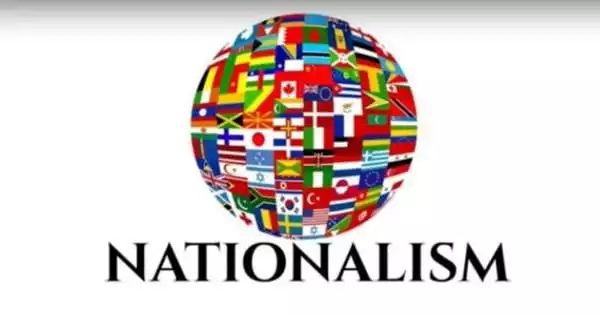Nationalism is a sacred passion, a profound moral and ethical belief, a national social expression, and a deep love for one’s country. Treating loyalty to one’s country is superior to all other loyalties is an unbreakable concept.
A true nationalist regards his country as the source of his existence and is willing to sacrifice his own interests for its sake. An ardent nationalist is willing to give up everything, including his life, for the sake of the nation. People worship and revere him as an incarnation of a super-being. Poets write verses in his honor, and everyone prays for his immortality. After death, he is regarded as an eternal source of inspiration, an ideal to be emulated by all, a guiding light that illuminates the path even after his departure.
Nationalism cannot be viewed as a passive or inconspicuous way of life. It is such an active and self-motivated inner emotion that drives him to do and risk everything for the sake of the nation. They die in order for others to live. Even in the history of our freedom struggle, there have been many instances where many people suffered unimaginable hardships and sacrificed their lives for the sake of the motherland. True nationalists were Shaheed Bhagat Singh, Bal Gangadhar Tilak, Subhash Chandra Bose, Bipin Chandra Pal, Chandra Shekhar, Mahatma Gandhi, and many others who had never cared for their own comfort and had lived and died for the cause of the Motherland.
Nationalism has remained and been regarded as a subject of eloquent praise on the lips of everyone since time immemorial, in all the histories of civilization. Love and attachment to one’s motherland are not unnatural; their origins can be traced back to the affection he receives from his motherland from the time he is born and grows up in that land. Everyone has a strong sense of patriotism and love for his country. “O for a glimpse of my Motherland so fair!” wrote an unknown poet, expressing his deep love for his motherland: “O for a glimpse of my Motherland so fair!” 0 for a whiff of its sweet-smelling air! Let me live there, and oh, let me die there! My dead body shall lie in sweet silence.”
Evils of Nationalism:
There is nothing wrong with loving one’s country or being loyal to one’s country, but when the love and loyalty become so strong that it results in hatred for all other countrymen and nations, it becomes evil. Blind nationalism dwarfs the mind in the same way that an unnatural Chinese woman’s shoes compress and distort her feet. When nationalism exceeds its reasonable limits, it becomes organized hypocrisy and breeds hatred for other nations. Extreme nationalism exalts war. When nationalism deviates from the path of reason and the common good, it frequently loses its sacred instincts and degenerates into aggressive nationalism.
A nationalist who lacks high moral and ethical considerations adores his country blindly and treats all other people on the planet as if they are barbarians, deserving no better treatment than his countrymen. In his will, Cecil Rhodes stated, “I contend that the British race is the finest which history has yet produced.” “France, it is the need of the universe that thou shouldst live,” Victor Hugo said. France, I repeat, is necessary for the human race.” These men had no idea that other races and people were created by the same Almighty and were no less than their countrymen.
Many European nations carried out their dominance mission and attempted to impose it by force on other countries. Nationalism, when combined with unworthy motives, self-centered greed for power, and imperialistic motives, becomes the worst cause of the world’s civilization’s demise. The folly of irrational nationalism can be seen in Rupert Brooke’s writings, in which he stated that when he died, he wished to go to an English Heaven.
Because of such parochial feelings, some of the world’s most eminent philanthropists and enlightened thinkers have advocated the concept of cosmopolitanism, which states that the entire world is everyone’s nation. The theory of cosmopolitanism rejects national boundaries, and everyone is a citizen of the world. It states that in this age of globalization, scientific inventions, and space research have brought the world closer together in wonderful ways and that discussing nationalism is a folly.
Nationalism’s ideas are nothing more than an orthodoxy of narrow thinking that has no relevance in this world of scientific and technological advancement. If we look at things objectively, millions of Indians are doing well in various countries around the world, they have allegiance to their respective countries, and they are emotionally attached to India, their motherland. Many foreign nationals visit India, some settle here, many foreign companies and their employees earn from our country, our companies have employees and offices in foreign countries, and the borders between nations have simply remained the boundaries for the purpose of obtaining passports and visas.
In such a situation, discussing nationalism appears to be superfluous. People have begun to consider what is best for the entire human race, for the entire civilization of the earth. Nowadays, the concept of cosmopolitanism is gradually gaining recognition and acceptance.
Conclusion:
Regardless of the various evils of nationalism, or extreme nationalism, it is a natural feeling acquired not through any technical means, but through birth, and it is a virtue in and of itself. Loving one’s mother and father is not a bad thing, and similarly, loving one’s country is not a bad thing, but hatred of other nations is the worst form of nationalism.
Nationalism becomes one of the most sacred emotions, worthy of the highest praise, if spiritualized with higher moral and ethical values, and if in opposition to Abraham Lincon’s motto, ‘With malice towards none, a charity for all.’ The nationalism of Hitler and Mussolini is the worst form of nationalism; we need nationalism that loves our country as well as those who live and let live in peace, prosperity, and affection for all.
















